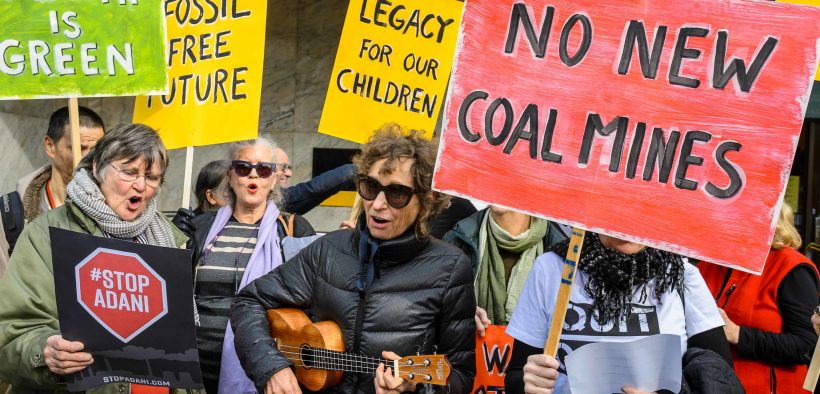130 Banks Worth $47 Trillion Pledge to Move Away From Fossil Fuels

“When the financial system shifts its capital away from resource-hungry, brown investments to those that back nature as solution, everybody wins in the long-term.”
On the eve of the United Nations climate summit in New York in Monday, a major segment of the global banking industry pledged to adopt U.N. “responsible banking” principles in an effort to combat climate change. The banks’ commitment to the U.N. principles suggests the banking industry will pivot its loan and investment portfolios away from fossil fuels and towards greener business ventures.
Deutsche Bank, Citigroup and Barclays were among the 130 banks to sign on to the U.N. pledge. Together the banks represent over $47 trillion in assets, representing approximately one-third of the global banking industry.
The banking principles were developed by the U.N. Environment Programme and a core group of 30 banks from around the world with the goal to align signatories with the U.N. Sustainable Development Goals and the Paris Agreement on Climate Change.
Six principles make up the responsible banking pledge:
- We will align our business strategy to be consistent with and contribute to individuals’ needs and society’s goals, as expressed in the Sustainable Development Goals, the Paris Climate Agreement and relevant national and regional frameworks.
- We will continuously increase our positive impacts while reducing the negative impacts on, and managing the risks to, people and environment resulting from our activities, products, and services. To this end, we will set and publish targets where we can have the most significant impacts.
- We will work responsibly with our clients and our customers to encourage sustainable practices and enable economic activities that create shared prosperity for current and future generations.
- We will proactively and responsibly consult, engage and partner with relevant stakeholders to achieve society’s goals.
- We will implement our commitment to these Principles through effective governance and a culture of responsible banking.
- We will periodically review our individual and collective implementation of these Principles and be transparent about and accountable for our positive and negative impacts and our contribution to society’s goals.
On Sunday, U.N. Secretary-General António Guterres said at the launch event, attended by the 130 Founding Signatories and over 45 of their CEOs, that “the UN Principles for Responsible Banking are a guide for the global banking industry to respond to, drive and benefit from a sustainable development economy. The Principles create the accountability that can realize responsibility, and the ambition that can drive action.”
The commitment to environmentally responsible banking principles by 130 banks drastically increases the pressure on fossil fuel companies in an industry already facing a rising tide of calls for various financial institutions and organizations to divest from.
In late July the European Investment Bank, one of the world’s most powerful financial institutions, announced that it would divest from all fossil fuel projects by the end of next year.
As Peter Castagno previously reported for Citizen Truth, the European Investment Bank’s decision comes as the latest victory in a movement that claims to have secured more than $8 trillion in divestment commitments from over 1,000 philanthropies, pension funds, universities and other institutions.
Additionally, this summer Chubb became the first major U.S. insurance company to pledge to stop insuring and investing in coal, announcing that Chubb “will not underwrite new risks for companies that generate more than 30% of revenues from thermal coal mining … [and] will phase out coverage of existing risks that exceed this threshold by 2022.”
So while the public sector in the U.S. and elsewhere hems and haws over the reality and seriousness of climate change, it is the often-maligned finance industry that may come to the rescue of environmentalists, as Inger Andersen, Executive Director of UNEP illustrated on Sunday.
“A banking industry that plans for the risks associated with climate change and other environmental challenges can not only drive the transition to low-carbon and climate-resilient economies, it can benefit from it. When the financial system shifts its capital away from resource-hungry, brown investments to those that back nature as solution, everybody wins in the long-term.”
















“Responsible banking”? As unprecedented as it is fictitious.
“Pledge”? Ask the UN how those work.
Friendlu reminder: It was Ronnie Reagan, B-movie “dramatic” actor who did away with responsible banking. No regulation = no responsibility.